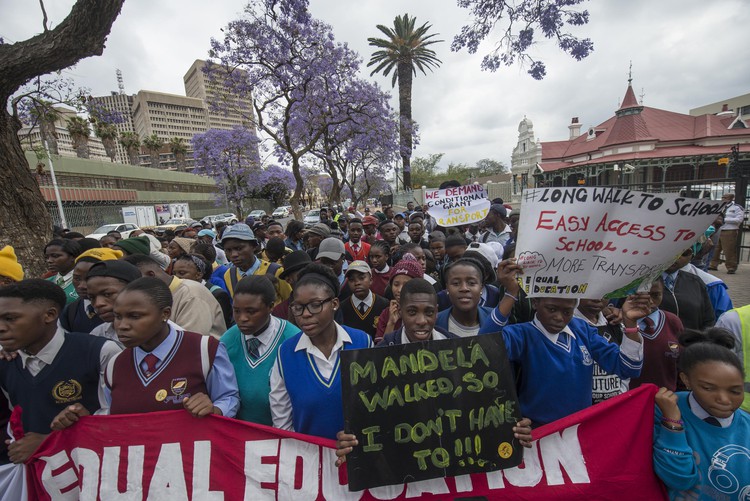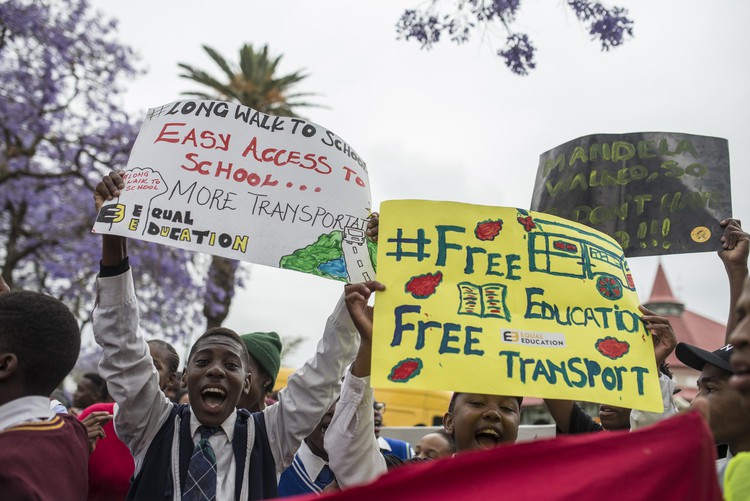Learners protest for transport grant
No decision yet but negotiations with Treasury are ongoing, according to DBE official
Sixteen year old learner Thandeka Mdlalose, left rural KwaZulu Natal at 4am so that she could make it to Pretoria in time to lend her voice to a protest for scholar transport outside the Department of Education. The protest was organised by activists from Equal Education. Mdlalose was joined by other learners from KwaZulu Natal as well as Gauteng who together numbered about 200. They picketed outside the main entrance to the Department of Education head office.
The grade ten student is just one of thousands of South African school pupils who have to walk long distances to get to school daily. Mdlalose said that she has to walk about 5 to 7km to an area where she then has to take a taxi to get to school. She has to get up extra early to make sure she can cover the distance in time and the taxi fare adds another R350 to her family’s monthly expenses. Much of the time she has to make the walk alone. On rural roads her uniform and shoes gets dusty and she feels unsafe.
She also talked of the poor state of the taxis that transports her and other learners to school. They are overloaded, unroadworthy and often in accidents; sometimes learners are killed in them.
Mdlalose said she was taking part in the protest to put pressure on the Minister of Basic Education, Angie Motshekga, to fast track a conditional grant for scholar transport. “Schools in rural areas like ours are in desperate need of safe, reliable transport to and from school. After walking for hours and sitting in those taxis I am tired when I reach home and this has a negative effect on my studies,” she said.
Samukelisiwe Kunene is an Equal Education activist who works with students in the Nquthu region in KwaZulu Natal. Kunene says that almost every learner from this area has to walk to school. “Some of these kids have to wake up about 4am everyday just so that they can leave their home by 5am because it takes them about 2 hours to get to their school. The routes are dangerous with some having to cross rivers,” said Kunene. Female learners are at a significantly higher risk of harm said Kunene. Learners have reported cases of sexual harassment and rape while making their way to school, she said.
In May Minister Motshekga announced plans to allocate ring-fenced funds to be utilized only for scholar transport. According to Luyolo Mazwembe, Equal Education’s Head of National Organising, the purpose of the protest was to remind the minister of her commitments and to push the department for concrete deadlines and update the public with on progress.
Equal Education has been advocating for scholar transport since 2014 and claims that there are over one million learners who are in need of it. Among the demands contained in a memorandum handed over to the department was that the conditional grant for scholar transport be made available in the 2018/2019 financial year. Protesters also demanded that the department, by 30 October, provide a written explanation of its engagement with National Treasury on the grant.
The memorandum was received by Granville Whittle the deputy director general of the Department of Education and the man responsible for scholar transport. He said that he would hand over the memorandum to Motshekga and would ensure that a response was communicated by the 30 October deadline. Whittle said that the minister could not receive the memorandum in person as she had prior commitments. “The national treasury is responsible for conditional grants so at the moment we are engaging with them and as soon as we receive some feedback from them we will make an announcement,” he said. He stressed that no decision on the grant had been made yet and that discussions with the relevant departments were ongoing.

Support independent journalism
Donate using Payfast

Don't miss out on the latest news
We respect your privacy, and promise we won't spam you.
Next: Gugulethu residents fight eviction
Previous: Education department’s “accelerated” school infrastructure programme hardly moves
© 2017 GroundUp. 
This article is licensed under a Creative Commons Attribution-NoDerivatives 4.0 International License.
You may republish this article, so long as you credit the authors and GroundUp, and do not change the text. Please include a link back to the original article.

